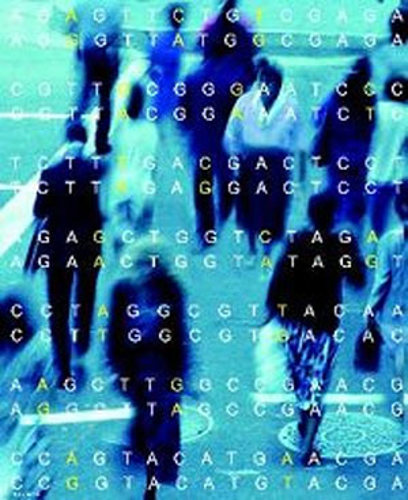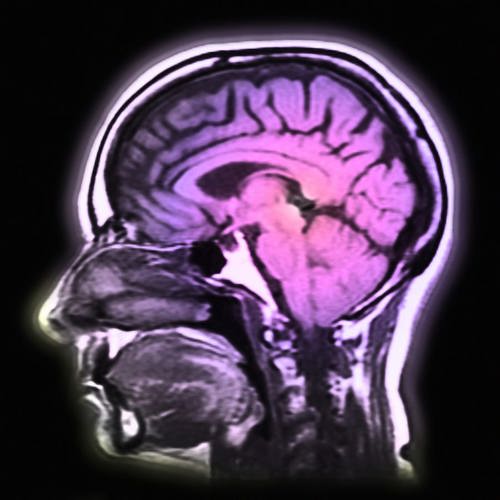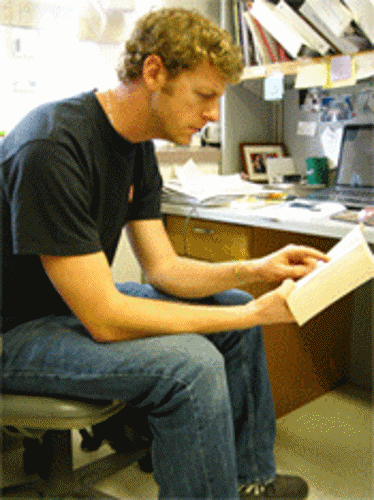
Dyslexia runs in my family. Will my grandkids be dsylexic too?
March 19, 2009

- Related Topics:
- Neurodiversity,
- Complex traits,
- Environmental influence
A curious adult from California asks:
"I am a father and I am very dyslexic. My wife’s brother is very dyslexic too. I have four children and two are dyslexic. What are the chances that their children will be dyslexic?"
I'm very sorry to hear about your struggles with dyslexia. As you know, dyslexia is a condition where people have trouble reading. And as you might have guessed from your situation, it can run in families too.
But dyslexia is not simple. In fact, it is so complicated that predicting who will get it is very tricky.
What we do know is that if one of your parents has dyslexia, you have a 40-60% chance of having it too. Your chances of getting it are even higher if more of your relatives have dyslexia.
From this you can tell that all your grandchildren do not have the same risk. Those with a parent with dyslexia are at a higher risk than those whose parents do not have the condition.
Based on what I've told you so far, you might guess that dyslexia is passed on through your genes. And you'd be partly right. But genes aren't the whole story -- the environment plays a role as well.
Dyslexia is Partly Genetic
Scientists have known about dyslexia since the late 1800's. It was then that they noticed that some kids with normal intelligence had trouble reading. It didn't take long for them to see that this problem ran in families too.
Since then, scientists have made a lot of progress in figuring out how genes may cause dyslexia. To understand how genes are involved, we first need to understand what genes are and how they work.
You have over 21,000 different genes. These genes have the instructions for building you and for making your body run smoothly.
Each gene has the instructions for one small part of you. Some genes control the color of your hair or eyes. Others help build your cells or carry oxygen. And others might help your brain interpret words. It is these last genes that may be involved in dyslexia.
Note that I said genes, not gene. Almost certainly more than one gene is involved in dyslexia. This is just what you'd expect from something as complicated as learning to read.
It is also important to mention here that dyslexia has nothing to do with intelligence. None of these genes makes someone less intelligent. The genes involved in dyslexia are probably involved more in the mechanics of reading. And in how our brains are wired.

Different people with dyslexia struggle with different parts of reading. Some people have trouble remembering what they just read. Others have trouble telling different sounds apart. And others have trouble recognizing a word as a whole rather than a collection of sounds.
Each of these tasks is probably controlled by different genes. Some people with dyslexia have versions of one set of genes that don't work well for reading. And a different group of dyslexic people might have a different set of genes involved.
So what are these genes that can influence reading skills? And what is different about them in people with dyslexia? Scientists haven't figured this all out yet. But they are making some progress.
Dyslexic DNA
Before going any further, I need to tell you one more thing. Genes are made of DNA. Scientists often find differences in affected people's DNA before they figure out the genes involved in a condition.
To find DNA differences that might be involved in a condition like dyslexia, scientists compare family members with and without the disease. If a DNA difference turns up more often in the group with the condition, then a gene near that DNA difference might be involved. Scientists call these DNA differences "markers."
As you might have guessed from the last paragraph, these markers don't always lead scientists right to the genes that may cause the condition being studied. They do lead them to very large DNA regions that can contain many genes. And one or more of these genes may be involved.
By doing lots of these kinds of studies, scientists have found nine regions that seem to be involved in dyslexia. Five of these regions have many, many genes making it hard for scientists to pinpoint the gene or genes involved.
But four of these "dyslexia regions" are small enough that they only have a few genes. That means that scientists can more easily predict which genes may be involved in dyslexia.
Three genes in these regions turn out to be pretty good candidates. All are involved in how our brains are wired and how our nerves talk to each other.
Dyslexia and Brain Wiring
Before you're even born, your body is hard at work building your brain. Part of this building involves making sure your nerve cells are put in the right place. And part of the building is making sure your nerve cells can talk to each other. They do this by reaching out to touch each other with lots of branches, like a tiny little tree.
This communication between cells is very important. It's what lets your brain control the things it does. Things like walking, talking, solving math problems, and reading.
Two of the genes that scientists think are involved in dyslexia are called DCDC2 and DYX1C1. They both help your nerve cells move to the right place while your brain is being built.
Another gene that scientists think is involved in dyslexia is called ROBO1. This gene helps your nerve cells to know where to send out their branches to talk to other nerve cells.

It is important to remember that people with dyslexia do not have different genes. They have different versions of the same genes.
So a person with dyslexia might have a ROBO1 gene with a small DNA difference in it. Another person with dyslexia might have a version of DCDC2 with a small difference. Or they might have a difference in some other gene.
These genes also highlight the point that dyslexia has nothing to do with intelligence. Dyslexia is a specific problem with brain wiring. Just because you're dyslexic, it doesn't mean you're less intelligent!
Genetics is not the Whole Story
There's an interesting twist to this story. Dyslexia is like many diseases in that genes are only part of the problem! In fact, scientists have found that genes can only explain 40-80% of dyslexia.
What this means is that 20-60% comes from somewhere else. That somewhere else is the environment.
"Environment" is a pretty vague term. It could mean almost anything. It could be something that happened before you were born. Or it could be something from your early childhood.
It could mean that there's something in the water affecting a person's health. Or it could mean stress in the person's life is increasing his or her chance for disease. Or it could be a thousand other things.

I'll give you a more concrete example. Let's say a child has dyslexia, but her genes only explain part of it. The rest could be explained by her seeing her father often struggle with reading. This makes her think that she will have trouble reading too.
Or it could simply be that the child came from a home in which the other family members just don't read very much. At least some of the time, it seems that this can increase a person's risk for dyslexia.
It's clear that the genetic causes of dyslexia are very important. But so are the non-genetic causes! Right now scientists are trying to figure out both parts.
They haven't made much progress on the environmental causes yet. But at least they have learned a bit more about the genes.
Scientists are going to keep studying dyslexia, though. The more we know about the disease, the more we can help dyslexic people to cope with it and lead productive lives.
Read More:
- Mayo clinic: More about dyslexia
- Medline: Developmental reading disorder
- Encyclopedia.com: Using DNA Markers to find genes
- A follow up question to this was asked in 2020: Is dyslexia genetic?

Author: Mark McElwain
When this answer was published in 2009, Mark was a Ph.D. candidate in the Department of Developmental Biology, studying WNT signalling in drosophila embryonic patterning in Roel Nusse’s laboratory. Mark wrote this answer while participating in the Stanford at The Tech program.
 Skip Navigation
Skip Navigation
